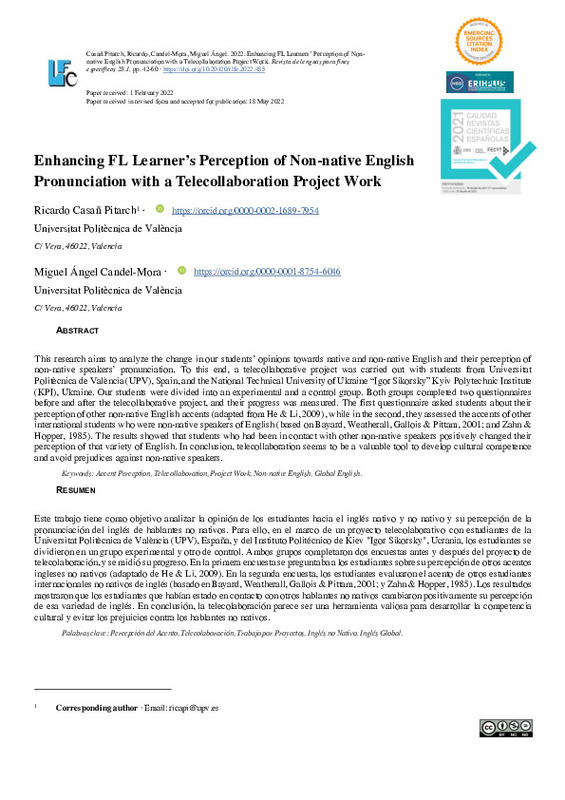JavaScript is disabled for your browser. Some features of this site may not work without it.
Buscar en RiuNet
Listar
Mi cuenta
Estadísticas
Ayuda RiuNet
Admin. UPV
Enhancing FL Learners' Perception of Non-native English Pronunciation with a Telecollaborative Project Work
Mostrar el registro sencillo del ítem
Ficheros en el ítem
| dc.contributor.author | Casañ-Pitarch, Ricardo
|
es_ES |
| dc.contributor.author | Candel-Mora, Miguel Ángel
|
es_ES |
| dc.date.accessioned | 2023-10-17T18:01:30Z | |
| dc.date.available | 2023-10-17T18:01:30Z | |
| dc.date.issued | 2022 | es_ES |
| dc.identifier.issn | 1133-1127 | es_ES |
| dc.identifier.uri | http://hdl.handle.net/10251/198249 | |
| dc.description.abstract | [ES] Este trabajo tiene como objetivo analizar la opinión de los estudiantes hacia el inglés nativo y no nativo y su percepción de la pronunciación del inglés de hablantes no nativos. Para ello, en el marco de un proyecto telecolaborativo con estudiantes de la Universitat Politècnica de València (UPV), España, y del Instituto Politécnico de Kiev "Igor Sikorsky", Ucrania, los estudiantes se dividieron en un grupo experimental y otro de control. Ambos grupos completaron dos encuestas antes y después del proyecto de telecolaboración, y se midió su progreso. En la primera encuesta se preguntaba a los estudiantes sobre su percepción de otros acentos ingleses no nativos (adaptado de He & Li, 2009). En la segunda encuesta, los estudiantes evaluaron el acento de otros estudiantes internacionales no nativos de inglés (basado en Bayard, Weatherall, Gallois & Pittam, 2001; y Zahn & Hopper, 1985). Los resultados mostraron que los estudiantes que habían estado en contacto con otros hablantes no nativos cambiaron positivamente su percepción de esa variedad de inglés. En conclusión, la telecolaboración parece ser una herramienta valiosa para desarrollar la competencia cultural y evitar los prejuicios contra los hablantes no nativos. | es_ES |
| dc.description.abstract | [EN] This research aims to analyze the change of our students' opinion towards native and non-native English and their perception of non-native speakers¿ pronunciation. To this purpose, telecollaborative project work was held with students from Universitat Politècnica de València (UPV), Spain, and the National Technical University of Ukraine ¿Igor Sikorsky¿ Kyiv Polytechnic Institute (KPI), Ukraine. Our students were divided into an experimental and a control group. Both groups completed two surveys before and after the telecollaborative project, and their progress was measured. The first survey enquired students about their perception of other non-native English accents (adapted from He & Li, 2009). In the second survey, students assessed the accent of other international students who were non-native of English (based on Bayard, Weatherall, Gallois & Pittam, 2001; and Zahn & Hopper, 1985). Results showed that students who had been in contact with other non-native speakers positively changed their perception of that variety of English. In conclusion, telecollaboration seems to be a valuable tool to develop cultural competence and avoid prejudices against non-native speakers. | es_ES |
| dc.description.sponsorship | This work is one of the results of the educational innovation and improvement project PIME / 20-21/202 "Teaching global English as a Lingua Franca among non-native speakers in virtual learning environments as a factor of competitiveness and integration in the professional environment" funded by the Vice-Rector's Office for Studies, Quality and Accreditation of the Universitat Politècnica de València: 2020 Learning + Teaching Call. | es_ES |
| dc.language | Inglés | es_ES |
| dc.publisher | Serv. Publicaciones de la Universidad de Las Palmas de Gran Canaria | es_ES |
| dc.relation.ispartof | LFE. Revista de Lenguas para Fines Específicos | es_ES |
| dc.rights | Reconocimiento - No comercial - Sin obra derivada (by-nc-nd) | es_ES |
| dc.subject | Telecollaboration | es_ES |
| dc.subject | Project Work | es_ES |
| dc.subject | English Language Teaching | es_ES |
| dc.subject | Language for Specific Purposes | es_ES |
| dc.subject | Percepción del Acento | es_ES |
| dc.subject | Telecolaboración | es_ES |
| dc.subject | Trabajo por Proyectos | es_ES |
| dc.subject | Inglés no Nativo | es_ES |
| dc.subject | Inglés Global | es_ES |
| dc.subject.classification | FILOLOGIA INGLESA | es_ES |
| dc.title | Enhancing FL Learners' Perception of Non-native English Pronunciation with a Telecollaborative Project Work | es_ES |
| dc.type | Artículo | es_ES |
| dc.relation.projectID | info:eu-repo/grantAgreement/UPV//PIME%2F20-21%2F202//La enseñanza del inglés global como lengua franca entre hablantes no nativos en entornos virtuales de aprendizaje como factor de competitividad e integración en el entorno profesional. Convocatoria Aprendizaje + Docencia 2020/ | es_ES |
| dc.rights.accessRights | Abierto | es_ES |
| dc.contributor.affiliation | Universitat Politècnica de València. Escuela Técnica Superior de Ingenieros Industriales - Escola Tècnica Superior d'Enginyers Industrials | es_ES |
| dc.description.bibliographicCitation | Casañ-Pitarch, R.; Candel-Mora, MÁ. (2022). Enhancing FL Learners' Perception of Non-native English Pronunciation with a Telecollaborative Project Work. LFE. Revista de Lenguas para Fines Específicos. 28(1):42-60. http://hdl.handle.net/10251/198249 | es_ES |
| dc.description.accrualMethod | S | es_ES |
| dc.relation.publisherversion | https://ojsspdc.ulpgc.es/ojs/index.php/LFE/article/view/1479 | es_ES |
| dc.description.upvformatpinicio | 42 | es_ES |
| dc.description.upvformatpfin | 60 | es_ES |
| dc.type.version | info:eu-repo/semantics/publishedVersion | es_ES |
| dc.description.volume | 28 | es_ES |
| dc.description.issue | 1 | es_ES |
| dc.relation.pasarela | S\464611 | es_ES |
| dc.contributor.funder | Universitat Politècnica de València | es_ES |






